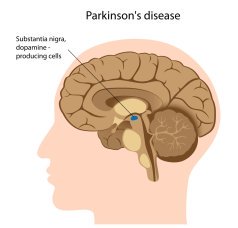Parkinson’s disease (PD) is a chronic and progressive movement disorder; symptoms continue and worsen over time. The disease causes the malfunction and death of vital neurons in the brain, primarily in the area called the substantia nigra. Some of these dying neurons produce dopamine, a chemical that sends messages to the part of the brain that controls movement and coordination. As PD progresses, the amount of dopamine produced in the brain decreases, leaving a person unable to control movement normally.Nearly one million people in the US are living with Parkinson’s disease. The cause is unknown, and although there is presently no cure, there are treatment options such as medication and surgery to manage its symptoms.
Parkinson’s Disease

